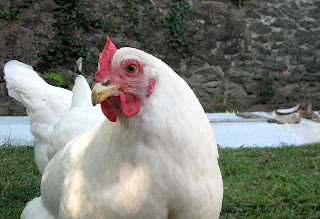Once again I’m using Science Decoded for my long form journalism class. Our assignment this week was to do a post that was under 350 words. I put up short posts all the time, but I decided to use the assignment to go back to my blogging style from last Fall and give a short run-down of newly published research.
Did you know that you can recycle a chicken? Well, recycle part of a chicken at least. Research has previously been proposed to use bio-waste (hair, nails, or in this case chicken feathers) to create plastics. But new research presented at the annual meeting of the American Chemical Society shows that a new mixture using 50% chicken feathers (the largest amount used to date) can actually make the material we use for shopping bags, eating utensils, children’s toys and millions of other objects.
Millions of chicken feathers are discarded in the United States each year, which makes finding a use for them highly worthwhile. Feathers are made of the protein keratin. When combined with the chemical methyl acrylate, the feathers form a strong but relatively light weight plastic substance.
 |
| Source: Wikimedia Commons |
Typically making plastics requires petroleum derived products like polyethylene and polypropylene. The feather-methyl acrylate combination could reduce the need for petroleum derived plastic products, which would be environmentally beneficial. Without petroleum the plastics would be more degradable and sustainable.
This research, led by Yiqi Yang of the University of Nebraska was conducted on a small scale. Until the new feather compound is tested on a large scale for ease of production and energy required for production it is unclear if it could realistically be used to manufacture commercial plastic products.
This research is exciting because it is essentially a form of recycling. The chicken feathers are just being discarded anyway, so if they can be used to make plastics that are more environmentally friendly not only will we benefit from finding a use for the feathers, we’ll also benefit from having a more sustainable plastic.
The big BUT in this article is that it needs further testing before it can be implemented. It is important with research like this to remember that a scientific find isn’t a definite. Just because something works on a small scale, doesn’t mean that it will work on a large scale. So even though the finding is exciting, it doesn’t mean that it will actually be implemented.
Chickens made a brief debut in my blog yesterday, too! They must be news stars this week.
I really like this post. Great information. Did the paper mention the shelf life of these plastics or how they compare with others currently in use?
I do like this chicken theme. But also recycling feathers is a really interesting idea. My husband actually worked as a turkey feather stacker when he was in high school. Summer job in a poultry processing plant. I always had the impression that we were filling up the nation’s dumps with feathers.
The uses for chicken feathers…who knew? I think using every possible part of the animal is truly the only way to be responsible meat-eaters.
And in these days, recycling and being a good steward for the environment is of the upmost importance.
Well-written and timely post, Erin!
I’ll be interested to see where this research ends up. On one hand, I think it’s great that there is an effort to discover a less harmful form of plastic. On the other, it could still feed our over-dependency on plastic. I liked that you include your “but” paragraph–it’s really good for readers to get that perspective about new scientific discoveries. Great post!
Ewwww, this will never catch on… it’s amazing what people will research.I can just imagine the horrible things some students had to do in the processing. Is it just keratin?? I hope they learned something, anyway. The issue keeps your interest and has kind of a whacky, mad scientist vibe. I think my jaw actually dropped while reading it, translation: good job! At least they are looking for alternative sources to petrochemicals!
JD